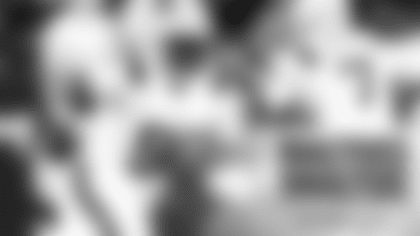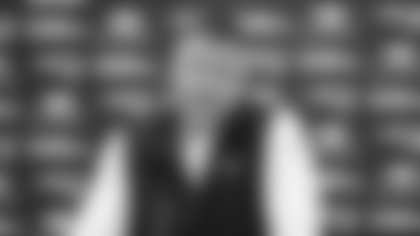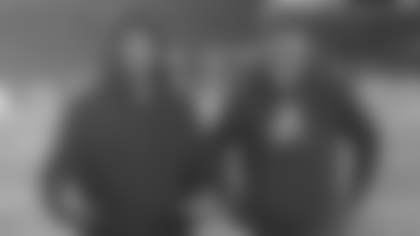Andre Tippett played his entire 12-year career with the New England Patriots. He earned five trips to the Pro Bowl, and is one of just seven linebackers in NFL history to record 100 career sacks. The former Iowa product was inducted into the Patriots Hall of Fame in 1999.
The former Iowa standout was the leader of the Patriots' defense in 1985 when the team won the first AFC Championship in franchise history. He sat down with Patriots Gameday to discuss his current position as Patriots Director of Football Development and Promotions, and the 1985 AFC Championship team.
It's been 20 years. Are the memories starting to fade?
No. They never fade. That was a good year for this organization. It was the first time the team had ever reached the pinnacle, the Super Bowl, which is everybody's goal every year.
What made the 1985 team so successful?
After the last game of the '84 season, a bunch of us got together before everyone took off for the offseason and we had a big pow wow to talk about what we needed to do to be successful in '85 because we were too good of a team to not have played better in '84. That was really when it all started. We all said the number one way to get ready for'85 was to have a solid offseason, and we probably had 90 percent participation in the offseason conditioning program.
You had a tough start though. You were 2-3 after five games.
Yeah, but the funny thing about that is we knew we were a good football team. I think it was getting everyone to know that and believe in that. Once we started believing in ourselves we were on a roll.
Legend has it that after a loss to Cleveland, on the road in Week 5, you took out your frustration on the visitors' locker room.
It goes back to the 2-3 start. I'm not saying I was clairvoyant or anything, but we were too good of a football team not to have played better in that game [a 24-20 loss on Oct. 6], not to have won. Basically it was pent up emotion. We were a better football team than that and we didn't show it that day. I think everything kind of came to a head with me. I wasn't trying to embarrass anybody. I just wanted to somehow find a way to say, 'Look, we are a better football team than what we showed today. No one should be able to outplay us, outhit us or intimidate us.'
It must have worked. You won six in a row after that and got into the playoffs.
Well, we got in on the Wild Card. We knew we weren't going to have home field advantage. We knew we were going to have to play on the road. Coach Berry did a great job throughout the year getting us ready for the start of those playoff games, having everybody aware. We had practices where we had rock music playing in the stadium to create noise. We basically had to go into each city and make each stadium our home field.
You've said that "there was magic in the air" surrounding that playoff run to the Super Bowl. Can you elaborate on that?
Those were some good teams, the Jets, Raiders and Dolphins. Great football teams. But it was just our time. It was crazy. The people were lined up at the airport in Rhode Island. It was an awesome feeling. Coming back from Miami, it was the coolest thing I've ever seen. It was kind of like the Super Bowl parades the last few years. People were out on the tarmac waiting for us. It was pretty cool. Though we didn't win the Super Bowl, we're still the first team to win an AFC Championship.
How fitting is it that the '85 team is being honored at the Miami game?
It makes sense. Squish the Fish. You couldn't ask for anything better. It's going to be great to honor the guys that were here before all the recent success happened.
When the guys come back to Foxborough, what is the first thing they will notice about what has changed around here?
The stadium. The stadium. They're going to freak out. Some of them started and finished their careers here, and to come back and see what the Krafts have done, how the organization has changed, they're going to be proud. A lot of them are still proud that they wore the red, white and blue, but to come back here and see everything, see the crowd, it's going to be emotional for them.
A lot of the fans are the same, though.
Of course. Other than some of the youngsters, there are a lot of fans that still remember Stanley Morgan and of course [Steve] Grogan and [Steve Nelson]. Irving Fryar, some of the special teams heroes we had, guys like Brian Ingram and [Rod] McSwain and Ernie Gibson. A lot of players on that team played a role in getting us to the Super Bowl.
Other than you, who was the toughest player on that team?
There were a lot of tough guys on that team. There probably isn't one guy I wouldn't go down a dark alleyway with. Don Blackmon, Larry McGrew, John Hannah, Ron Wooten, Lin Dawson. I'd even take some of the wide receivers down a dark alleyway too.
Were there any guys that were underrated then or are underrated now, looking back?
A lot of guys, really. On the defensive side, a guy like Johnny Rembert, although he got some starts, he played a third down role for us a lot and he filled in when someone got banged up. Ernest Gibson played some cornerback. Cedric Jones was probably our Troy Brown. You could count on him to go up and make that great catch in the clutch. Robert Weathers at running back. He played a very significant role in our playoff run. There were a bunch of guys then that probably would have fit in here with Bill [Belichick]. A lot of guys played roles.
Which of the guys are you most looking forward to seeing?
All of the linebackers. We had such a tight-knit group. To this day we still stay in communication. And there are a few of the guys that don't live in the area that I can't wait to see: Lin Dawson, Ron Wooten, Derrick Ramsey. But I'll be looking mostly for the linebackers first, and give them all a big hug.
Will the conversations be more about sharing memories from back then or about what everyone is up to now?
It will definitely be about sharing memories, and probably a little bit of talk about now. A lot of the guys that were here through most of my career have gone on to be pretty successful. A lot of the guys are athletic directors at different universities. Some of the guys have gone into the corporate world. Some guys have opened some businesses on their own. You'll hear a lot of different stories.
If you were on the current Patriots team, what type of player would you be?
I would probably play pretty much the same role that I did back then. We were predominantly a 3-4 team. I was probably one of the best pass rushers on the team, so I definitely would be an every down player. Put me down on the edge and let me rush on third down and long. When it's first and second down, I'd be at the left outside linebacker spot. It wouldn't be much different. But knowing Bill, I probably would have gotten about 30 more sacks.
How special would it be if you were elected to the Hall of Fame?
That place is, in my opinion, is very sacred, hallowed ground. It is for the best guys that have ever played the game, guys that have played a significant role in the National Football League. It's exciting. You live forever when you're there. It's special.
You're remembered for a lot of things, but one of the things for which you're most remembered is your toughness. What is the difference between regular tough and football tough?
That's a good question. There probably isn't much difference. As many times as I should have, I've never backed down from a fight in my life. And on the football field I never backed down from a challenge from anyone. I always looked at it as a challenge. To me, toughness is leadership. Toughness is being a leader.
Part of your aura as a player was your interest in martial arts. How much of that did you bring to the field? And are you still involved in it?
Martial arts played a major role in my football career. Not so much kicking and punching or anything like that… but understanding leverage, manipulating the hands and arms as a pass rusher, adding to my basic swim, rip, club, uppercut pass rush moves. I was able to have a better feel for leverage, knowing when to give and go. It helped me out as a pass rusher. As far as still training, I'm still very active in it. It's something you can do forever. There are 80-year-olds that are still training. I hope to be like that when I'm in my 70s and, hopefully, in my 80s, if I live that long.
Is that how you stay in shape? Because you're still a physical specimen.
Yeah, it's a major part of what I do. I still like to get a couple of workouts in. The nice thing about karate is I can push the furniture around in my office and do some kata to get the heart rate going. I still go to the dojo and train with my instructor.
Do you still get recognized?
It's funny. Just when I think I've gotten over the hill, and I can go slip into a bar and have a drink with some friends or go out to dinner with some couples and not get noticed, people look at you. They look at you right away and, "Hey Andre. How are you?" My kids, my younger ones who never saw me play, get a kick out of it. They puff their chest out. "Dad. Does that guy know you Dad?" I have to say, "No. But he remembers me from my playing days."
How about when you work with kids in your role for the Patriots? Are they clueless about who you are?
Not really. It's funny. If I ever go to a speaking engagement to speak to the youth or I am at a football camp speaking to the youth, I always start out the conversation with, "I am your parents ESPN classic highlights." And a lot of the parents tell the kids, "This guy here was a great football player." And a lot of the kids in my neighborhood will see me out playing around with my kids and they'll say, "Hey, I saw you on ESPN Classic." And I'll say, "What did you think?" and they'll say, "You were a good player," and I'll say, "Well I appreciate that."
You're the Director of Football Development and Promotions for the Patriots. What does that mean? What are your day-to-day responsibilities?
We're trying to keep the game of football available to the youth today. Whether that be sponsoring Pop Warner Football, flag football, Punt, Pass and Kick. We try to develop programs in the New England area to reach out and give support in every area, be it high school, junior high, CYO, JCC, Boys and Girls Clubs, YMCAs. We want to keep the game alive. We want to continue to help with the improvement of coaching, Pop Warner and high school coaching. We sponsor clinics. We want to keep the game out there and improve it every year.
Now that you're in the front office, how has your perspective changed on the game, specifically with regard to the game as a business?
I think I have a better perspective on the bigger picture. Ownership, coaching staff, personnel, marketing, human resources, the charitable foundation, how everything has to go hand-in-hand in order for it to work. It's like having a good football team. You have to have all the parts in place. We all, in an indirect way, affect how things get done. Being in scouting for a long time, I understand the hard work that the scouts put in. I've been very lucky to be part of a lot of aspects of this organization. I'm a proponent of the philosophy that, although you're not on the football team, you should look at it as being a team player.
How about the game itself, how has it changed? More specifically, is the defense more complicated than when you played?
I'll tell you what, if we had the salary cap in place back then it would probably be like it is now.
Would you have spent your entire career here if there were a salary cap?
Probably not. Probably not. Not that I would have wanted to go, but it would have been one of those deals where, if I played the way I did, they would have said, "We can't afford you anymore, unless you're willing to take less." It's tough. But the game in itself now, it's different. It's more specialized. You have to be concerned about having a specific quarterback. Not every quarterback can play for every team in the league. You have to be sure that you have that left offensive tackle. You have to have a dominant running back. You have to have a go-to receiver. You have to have cornerbacks that can cover. Back in our day, if you had an overall group of guys who could play, you got it done.
And that's how you got it done in '85, right? You had a lot of guys contribute, a couple of different quarterbacks, a bunch of running backs.
Exactly. And now you're talking 28 teams then versus 32 teams. Because then the talent level gets tainted a little, you ruin out of guys to pick. You have to be on top of the guys, you have to spend more time concentrating on the players, their backgrounds, finding out of the guy really fits. And it is really important to have a guy fit your specific team. Bill Belichick has done a really good job in the last four of five years of finding guys who fit what we do here, offensively, defensively and on special teams. And then you have the salary cap. You basically have to have a few guys on your team that you're willing to say, "Alright, if someone gets hurt, who are we going to cut to bring in someone else? There are some guys on the team that are on the team for that reason. That might be the guy that gets cut if someone gets hurt and you have to replace him." So it's become more specialized. And then coaching. Coaching has taken on a bigger role. There are a lot of X and O guys that can get on the board and do a lot of things and talk football, but when it comes to game-day situations, being able to watch their DBs or being able to watch the offensive line or watch the running backs and see what's happening. A player comes to the sideline and says, "Coach, I don't know what I'm doing," if you have coaches who can coach on the run, you're going to always have the advantage.
How come you never coached?
I like to play golf too much. I like to play golf too much. People always ask me, 'Why don't you coach?' But I coached my sons Pop Warner football team and it made me realize, 'You know what, I like playing golf a little bit more than I do coaching.' One of these days I might, who knows? I love to teach. I love talking about linebacking play. I love talking about defensive line play. I can even talk about wide receiver play and DB play.
But you're never not going to not want to play golf. It's not like that's going to wane.
Yeah. It could be 100 degrees out there and I'll say, "I guess I'll have to go out there early and play." I'll play early in the morning or late in the day, but I'll never not play.
Are you disappointed that this reunion is happening in January, because you could have gone golfing with your former teammates?
Originally we were going to do it on the early part of the year, but it just so happened that it worked out for the better with the Miami game at the end of the year. But we were going to do a golf tournament. We actually did that for our 10-year anniversary in 1995. We had a nice little outing. I forget who took the money. Someone took a nice pot of money. It wasn't me. I was ready to redeem myself and get a hold of that pit this year.
So what are you looking forward to instead?
The camaraderie. We were big on it. And the players today are still big on it. It will be that one last chance to feel that camaraderie. Because who knows who we're going to be able to see another 10 years from now. Another 20 years from now. It will be one more time to have that camaraderie where we can sit around and talk about each other and talk about some of the stuff that was funny and talk about the coaches that we cared so much about. The camaraderie will be the big thing.
































